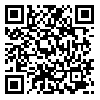Tue, Feb 3, 2026
Volume 11, Issue 1 (Winter 2025)
Caspian J Neurol Sci 2025, 11(1): 87-94 |
Back to browse issues page
Download citation:
BibTeX | RIS | EndNote | Medlars | ProCite | Reference Manager | RefWorks
Send citation to:



BibTeX | RIS | EndNote | Medlars | ProCite | Reference Manager | RefWorks
Send citation to:
Ehtiatkar Z, Saberi A, Ghorbani Shirkouhi S, Hosseininezhad M, Yousefzadeh-Chabok S, Moadabi Y, et al . Nano-curcumin Effects on Ischemic Stroke Clinical Outcomes and Interleukin-6 Levels: Pilot Randomized Clinical Trial. Caspian J Neurol Sci 2025; 11 (1) :87-94
URL: http://cjns.gums.ac.ir/article-1-768-en.html
URL: http://cjns.gums.ac.ir/article-1-768-en.html
Zeinab Ehtiatkar1 

 , Alia Saberi1
, Alia Saberi1 

 , Samaneh Ghorbani Shirkouhi1
, Samaneh Ghorbani Shirkouhi1 

 , Mozaffar Hosseininezhad1
, Mozaffar Hosseininezhad1 

 , Shahrokh Yousefzadeh-Chabok2
, Shahrokh Yousefzadeh-Chabok2 

 , Yaser Moadabi1
, Yaser Moadabi1 

 , Ashkan Karimi1
, Ashkan Karimi1 

 , Haniyeh Shadrou Gharani1
, Haniyeh Shadrou Gharani1 

 , Sasan Andalib *3
, Sasan Andalib *3 




 , Alia Saberi1
, Alia Saberi1 

 , Samaneh Ghorbani Shirkouhi1
, Samaneh Ghorbani Shirkouhi1 

 , Mozaffar Hosseininezhad1
, Mozaffar Hosseininezhad1 

 , Shahrokh Yousefzadeh-Chabok2
, Shahrokh Yousefzadeh-Chabok2 

 , Yaser Moadabi1
, Yaser Moadabi1 

 , Ashkan Karimi1
, Ashkan Karimi1 

 , Haniyeh Shadrou Gharani1
, Haniyeh Shadrou Gharani1 

 , Sasan Andalib *3
, Sasan Andalib *3 


1- Neuroscience Research Center, School of Medicine, Poursina Hospital, Guilan University of Medical Sciences, Rasht, Iran.
2- Road Trauma Research Center, Trauma Institute, Guilan University of Medical Sciences, Rasht, Iran.
3- Research Unit of Neurology, Department of Clinical Research, Faculty of Health Sciences, University of Southern Denmark, Odense, Denmark. ,sasan.andalib@health.sdu.dk
2- Road Trauma Research Center, Trauma Institute, Guilan University of Medical Sciences, Rasht, Iran.
3- Research Unit of Neurology, Department of Clinical Research, Faculty of Health Sciences, University of Southern Denmark, Odense, Denmark. ,
Abstract: (924 Views)
Background: Accumulation of inflammatory factors in the stroke area results in brain tissue damage and a patient’s disability. It has been demonstrated that curcumin has neuroprotective effects.
Objectives: This study aims to evaluate the effects of nano-curcumin, a more stable and soluble form than the common curcumin, on the National Institutes of Health Stroke scale (NIHSS) and modified Rankin scale (mRS) scores and interleukin-6 (IL-6) serum levels in ischemic stroke patients.
Materials & Methods: Forty ischemic stroke patients were randomly divided into two groups of nano-curcumin and control, with 20 patients in each group. The curcumin group received nano-curcumin with a dose of 80 mg/d for one month, and the control group received placebo. Neurological disabilities were assessed by NIHSS and mRS over three time points. IL-6 serum levels were evaluated over two time points. Infarct area volume was evaluated in two time points.
Results: NIHSS and mRS scores were significantly lower in the curcumin group than in the control group (P=0.038 and P<0.001, respectively). Serum levels of IL-6 were significantly lower in the curcumin group than in the controls (P<0.001). The cerebral infarct volume did not change significantly one week after the treatment with curcumin.
Conclusion: Nano-curcumin improves the stroke clinical symptoms in ischemic stroke patients, as indicated by the reduction of NIHSS and mRS, in addition to a decrease in serum levels of IL-6.
Objectives: This study aims to evaluate the effects of nano-curcumin, a more stable and soluble form than the common curcumin, on the National Institutes of Health Stroke scale (NIHSS) and modified Rankin scale (mRS) scores and interleukin-6 (IL-6) serum levels in ischemic stroke patients.
Materials & Methods: Forty ischemic stroke patients were randomly divided into two groups of nano-curcumin and control, with 20 patients in each group. The curcumin group received nano-curcumin with a dose of 80 mg/d for one month, and the control group received placebo. Neurological disabilities were assessed by NIHSS and mRS over three time points. IL-6 serum levels were evaluated over two time points. Infarct area volume was evaluated in two time points.
Results: NIHSS and mRS scores were significantly lower in the curcumin group than in the control group (P=0.038 and P<0.001, respectively). Serum levels of IL-6 were significantly lower in the curcumin group than in the controls (P<0.001). The cerebral infarct volume did not change significantly one week after the treatment with curcumin.
Conclusion: Nano-curcumin improves the stroke clinical symptoms in ischemic stroke patients, as indicated by the reduction of NIHSS and mRS, in addition to a decrease in serum levels of IL-6.
Type of Study: Research |
Subject:
Special
Received: 2025/01/3 | Accepted: 2025/01/30 | Published: 2025/01/12
Received: 2025/01/3 | Accepted: 2025/01/30 | Published: 2025/01/12
Send email to the article author
| Rights and permissions | |
 | This work is licensed under a Creative Commons Attribution-NonCommercial 4.0 International License. |



